For Sarah Higgins, Director of Indigenous Engagement at Bissell Centre, the word that comes most to mind when she thinks about National Day for Truth and Reconciliation is ceremony. She explains how every Indigenous member of Bissell Centre’s staff and community has a direct correlation to or has been directly impacted by residential schools.
“It’s a way to express our grief and heal from our losses in a healthy and enriching way,” says Higgins. Bissell Centre is holding its own National Day for Truth and Reconciliation ceremony on September 29 from noon to 9:00 p.m. and will feature a pipe ceremony, a Round Dance, and a traditional feast provided by Red Seal Indigenous Chef Matthew Potts.
A History of Indigenous Cultural Ceremonies
While Bissell Centre’s event in downtown Edmonton (10527 96 Street) is open to everyone, it’s far from a celebration. National Day for Truth and Reconciliation was born from the 94 Calls to Action from the Truth and Reconciliation Commission – and after mass graves were found at multiple sites of residential schools across the country. Cultural Support Worker Brandon Lee-McDonald explains how at one point, holding this very event would have landed everyone participating in prison.
“Up until 1951, when the Indian Act was amended, we weren’t allowed to have our drum circles, we had to change the names of our ceremonies, we essentially had to hide in the bushes to express our cultural identity,” says Lee-McDonald. “Our ancestors suffered and died so we could hold our ceremonies in public again. Without their sacrifice, we wouldn’t be able to have this ceremony in downtown Edmonton.”
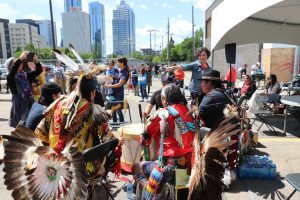
What this Day Means at Bissell Centre
A tenant of the National Truth and Reconciliation event at Bissell Centre is honouring those who survived residential schools. There will be a list of survivors in attendance during the event, to recognize their resilience in the face of an atrocity that took so many.
It might look like we’re celebrating at our National Day for Truth and Reconciliation event, but we’re mourning and grieving,” says Lee-McDonald. “We’re acknowledging the survivors of residential schools and honouring them. This is our day to mourn in a healthy way from our past traumas.”
While everyone at the National Truth and Reconciliation Day event at Bissell Centre will be commemorating that they’re still here, there is still a lot of healing to be done. National Day for Truth and Reconciliation may be about grief and healing, but it’s also about empowerment and reclamation.
“This is a day given to us by the Creator,” says Lee-McDonald. “It was given to help us grieve and heal and be healthy. We want to take this day for our ceremony and live our truths in our cultural identity. It’s a big deal we can hold this ceremony on the streets of Edmonton.”
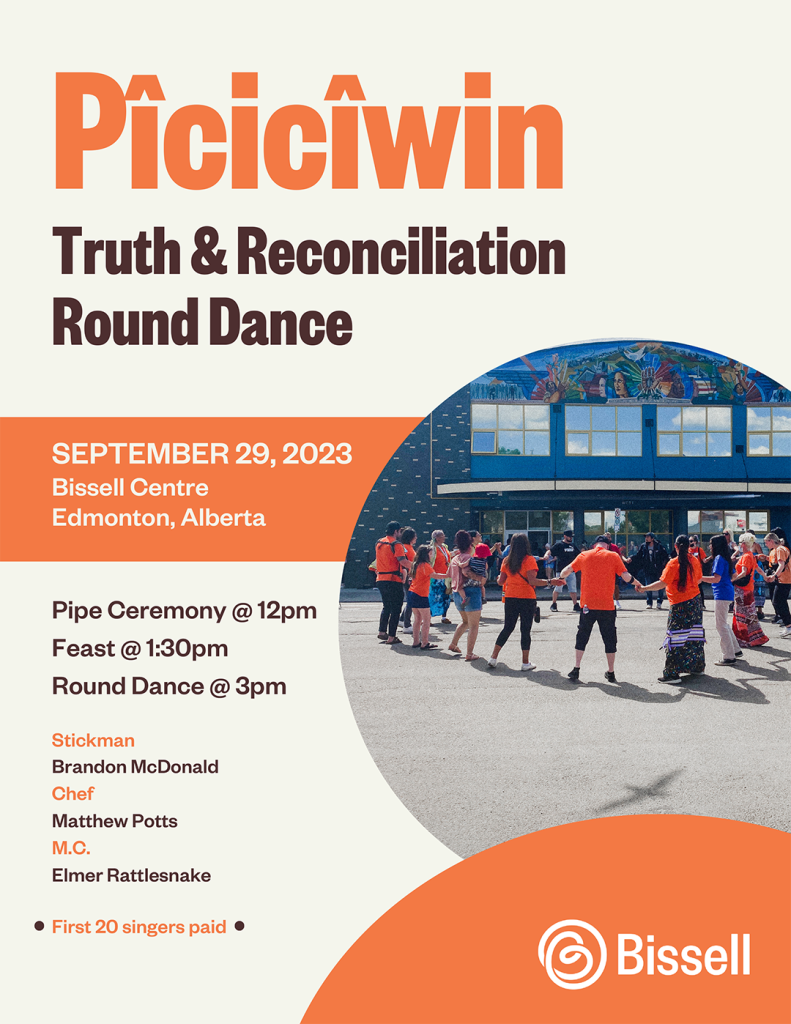
Individuals connected to our Fetal Alcohol Spectrum of Services (FASS) program contributed to a book about the challenges and realities of navigating life with Fetal Alcohol Spectrum Disorder (FASD). Under the guidance of Jared Epp, Carleton University PhD candidate and former housing support worker with Bissell Centre, who facilitated the group in sharing stories of what was most important to them. Fifteen people shared their stories, captured in this captivating collection. Born Broken is a book that’s an immersive experience into what it means to have FASD and the barriers it can create.
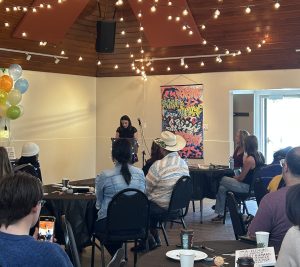
The group celebrated the release of this Born Broken book this past month with a small and intimate reading and sharing. Everyone who contributed to the book received a copy, and a few were shared around the community to help spread its positive message.
Copies of Born Broken books are available to purchase from the Bissell Thrift Shop on 118 Avenue or Paper Birch Books at 10825 95 Street.
Below is the preface to the book, written by Jared Epp. This firsthand experience of seeing the collection come together illuminated the importance of this book for the contributors and for those about to read it and gain a better understanding of FASD.

Preface from Born Broken
A group of individuals connected to Bissell Centre’s Fetal Alcohol Spectrum of Services (FASS) came together for a book project. The goal was to provide an opportunity for folks to share whatever kind of content they wanted. Leaving it open-ended allowed the individuals participating in the project to share what was meaningful to them. Their contributions didn’t have to only be about living with Fetal Alcohol Spectrum Disorder (FASD). A number of contributors did want to share their stories about living with FAD, about their daily challenges, as well as the impact of receiving their diagnosis. Others talked about different things. There are stories about adventure on Edmonton’s public transit, sewing denim, dreaming, making music and art, the challenges of finding and keeping a job and many other events and situations the reader will soon encounter.
Woven throughout the book are stories, ideas, frustrations, thoughts and reflections, offering a window into the experience of entering into the world a certain way.
In our last group meeting, we had to come up with a title for the book. Each contributor present was invited to come up with some titles, and then there would be a vote.
These were the title ideas:
- Born Broken
- The Struggle is Real
- Drumbeats of Hope
- Light in the Dark
- Perfectly Imperfect
- Getting Dealt a Bad Hand
Everyone had agreed on Heidi’s subtitle, “Reflections on Life and Resiliency from Individuals living with FASD,” as it put a positive spin on the main title.
Born Broken won by one vote over The Struggle is Real and Light in the Dark. There was a lot of discussion and debate on the chosen title. Some people felt it was too negative, but they also acknowledged it’s sentiment. In many ways, the titles and the debate around it set a theme that echoes through each story: individuals confronting and overcoming something they were born with, have no control over, and yet seems invisible to those outside the lived experience of FASD. The reader is invited to encounter the diverse contributions within the book, keeping in mind the unsettled nature of its title and the realities of living with FASD.
-Jared Epp

Here’s some quick math: If one person had 15,000 pairs of underwear, they could wear a new pair every day for close to 30 years.
At Bissell Centre, we give out 15,000 pairs of new underwear to our Community Members every six months – and the need is still growing.
Underwear isn’t often the first need most people think about when they want to support folks experiencing poverty. Oftentimes, clean underwear makes a huge difference not only in someone’s personal feelings and outlook. It can also help with physical and mental health issues that can be life-changing.

Physical Health Benefits of Clean Underwear
Underwear accumulates a lot of microbes from your body and collects bacteria that can fester without washing. Not only is that an awful odour to try to live in, but it also sticks to the skin and, if left for too long, can lead to infections. It’s even a direct cause of kidney failure and bladder cancer.
Changing into clean underwear is the only way to reduce that risk. If we have no underwear to give out to folks, it’s likely that many more people will be going into emergency rooms and dying from something so easily preventable.

Mental Health Benefits of Clean Underwear
A lot of difference can be made with a little more comfort. A stop by our Community Space includes a hot shower, a meal, some time to do laundry, and a stop by the Community Closet for some fresh clothes. Those four steps are crucial to folks deciding to take the next step and look for help to find their way out of poverty. When you’re working through hard times, fresh underwear is priceless.
This is where we build trust and watch their self-confidence grow. They’re not afraid to talk to people anymore. They’re okay opening up about what their goals look like. Then they start to feel dignity and understand they are worth more than their challenges or their situation. This is when they reach out for help with their mental health, addictions, housing, and employment.
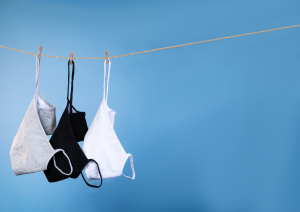
15,000 Pairs of Underwear Donations are Needed
For as long as Bissell Centre has been giving clothes to folks who need them most, underwear has been the single most requested item – but it’s also the least donated. That’s why, each year, we run the Drop Your Gonch campaign. Folks don’t often think about underwear – it’s an embarrassing topic. It’s also an important topic – especially for folks in our community.
Make sure to check out the Drop Your Gonch information page for drop-off locations, donation wish lists, and lists of items we can’t accept.
And think of underwear the next time you get a bag of donations together. Pick up a fresh pair on your way and drop them in the bag. A quick extra step could change a life.
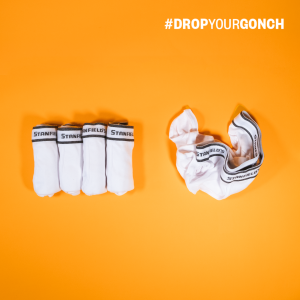
In 2022, Bissell Centre took a long hard look at itself and asked what can be a scary question – what are our 2SLGBTQIA+ team and community members experiencing here? What does Pride at Bissell look like? Are these folks being embraced and celebrated? Are they comfortable being their truest selves here?
41 team members participated in a survey focused on 2SLGBTQIA+ issues – 12 from 2SLGBTQIA+ communities. The results of the survey were promising, and a lot of organizations would take that as a sweeping success and end their efforts there. Instead, we wondered how best to push our organization even further.
Through the results of this survey, summer intern J. Heber looked at the qualitative stats, thought about how they represented the diverse 2SLGBTQIA+ presence at Bissell Centre, and created a fibre art piece to represent that diversity across the organizations.
It is an expression of all the different flags and colours that express the different gender identities and sexual orientations that makeup Pride. Today, it proudly hangs in our Community Space. It stands as a reminder to folks that our diversity is our strength, and inclusion is essential. It also features seeds and the words, “Let’s Grow Together,” demonstrating the seeds of compassion and the thirst for knowledge that helps us all better understand and appreciate one another.
We’re going to let our 2SLGBTQIA+ staff members speak for themselves. Exploring, in their own words, how Bissell Centre is working to improve equity for 2SLGBTQIA+ folks, what their experiences have been like at Bissell, and what Pride month means to them.
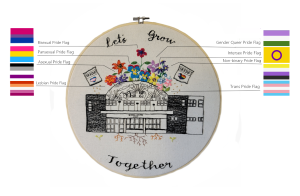
Allen
Bissell Centre gives out free rainbow stickers to everyone. I want to point this out first and foremost. It’s the first thing I think about when I think about how Bissell Centre is a safe space.
I joined Bissell Centre in 2020, and I wasn’t sure if I should be open about my gender identity. I saw a lot of staff here be comfortable and open and safe with who they are. Everyone here makes the effort to use my preferred pronouns (he/him) – and anyone who mistakenly uses the wrong pronouns is quick to apologize and correct it. That makes me feel respected and cared for by Bissell Centre.
Especially compared to my home country, Bissell Centre is welcoming to who I truly am. Here, I get to show my Pride without shame or any fear. I get to be open, and that’s important not just for me but for anyone who wants to express their Pride.
Even our community participants treat 2SLGCTQIA+ people with respect and equality. No one ever has anything negative to say about the clothes we choose, how we present, or how we choose to look according to our gender identity. Having this freedom and acceptance is so important for 2SLGBTQIA+ folks and how we can contribute back to our communities.
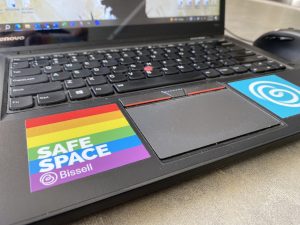
Clinton
When I was placed at Bissell Centre for my social work practicum, I was nervous about entering a new space. Being a member of the 2SLGBTQIA+ community, I am always wary when entering a new space. I don’t know if it’s safe, if I will be harassed or if I can truly be myself.
I remember about a month into my practicum, I mentioned how I noticed there wasn’t really any noticeable visual representation to let new staff and community members know that Bissell is a queer-friendly space. So, we came up with the idea for me to create a 2SLGBTQIA+ resource list for both staff and community members.
Then, I started noticing pride flag stickers placed on doors and laptops. My supervisor told me because I had the courage to identify the gap between Bissell and the queer community, she ordered gender-neutral bathroom signs for the bathrooms in the Community Space. I couldn’t believe that I was a catalyst for these changes. Bissell Centre is not just another group that celebrates pride once a year. They listen to the concerns people have and do what they can to improve.
The community members make Bissell Centre different too. I often get comments that I give off two-spirit energy. I learned that two-spirit folks in Indigenous culture are sacred, which makes me feel honoured. I don’t currently identify as two-spirit – the community members made me curious, and I have since been exploring that side of myself. Because the community members and the staff have created a judgment-free space, it has allowed me to safely be my true self.
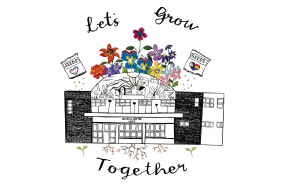
Michelle’s Story About Overcoming Poverty
This is Michelle. She grew up in Edmonton. Whenever Michelle returns to Edmonton, she sits on the curb next to Bissell Centre’s community space. “This is where she sat,” Michelle says. “And I feel like she’s still here. I tell her that I love her whenever I sit here.”
Michelle’s mom regularly visited Bissell Centre, requiring services from drop-in supports to the housing program. “My mom was a residential school survivor, she became addicted to alcohol and drugs over the years. She was the most loving, kind mom before that.”
She sits on the curb, lights the sage in a small cast iron skillet and places her headphones into her ears. She takes a long breath and starts talking to her mom about overcoming poverty. She tells her how she’s taking care of the babies, getting her degree, and working in corporate now – that she’s doing really good.
When Michelle says she’s doing really good, this carries a very heavy weight. This means she’s helping her children heal, providing for her family, and moving forward away from the cycle of poverty she knew. She’s breaking Intergenerational trauma and overcoming systemic oppression. And she’s able to give back.
Another breath and she begins singing. Not starting with a whisper, but right from the bottom of her feet, out her mouth, and reverberating across 96 Street. Wandering up and down the alleyway where her mother passed away, she releases every emotion in her being with every word she sings.
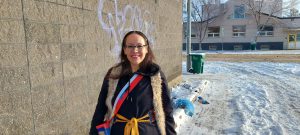
Where Michelle is today
Today, Michelle is a social worker with a background in childcare and Indigenous culture. She now lives in central Alberta. She is part of an Alberta Health Services advisory council, where she regularly attends meetings to help offer better services to all Albertans.
Overcoming poverty was not an easy path. Growing up in poverty and with parents experiencing addiction meant she had to work four times as hard to get where she is today. Michelle was able to find a path that was healthier and more fulfilling for her and her family.
Michelle’s Journey to Bissell
As a child, Michelle (along with her mother and three siblings) left their northern Alberta community to escape toxic family dynamics and domestic violence. The family travelled to Edmonton for a better life. But both of her parents quickly experienced addictions, and it wasn’t long before Michelle’s mother found herself living in Edmonton without shelter.
After she became a parent, Michelle came to Bissell Centre for some basic needs, the child care program, and the parent program. This is where she met childcare worker Fatima and family supports worker Cheryl. Michelle felt honoured that these women heard her story and believed she could one day leave poverty behind – once and for all. It was the first time Michelle felt like her support was nonjudgmental, encouraging, and believed in her goals.
“Being an Indigenous woman, in my experience, was being told to be quiet a lot,” Michelle says. She points out how Bissell’s service delivery approach helped her heal from her trauma. “Many programs [from other service providers] would often parent or monitor my life. Bissell treated me like a person. They gave me wings to fly.”
Michelle and her siblings each had their own challenges with poverty and addiction as they grew into adults. Though Michelle overcame her challenges, much of her family succumbed to their challenges. She honours her only brother’s death in 2015, her youngest sister’s death from COVID in 2022, and her sister-in-law’s death that same year. By 2016, her mother’s life would be cut short by complications due to pneumonia.

Michelle’s Giving Back
Speaking from her experiences, Michelle thinks trauma is often not openly spoken about. She did not have access to many role models speaking eloquently about the realities of being Indigenous. She’s learning to manage her trauma through post-secondary education, her art, her work as a facilitator, and being a two-spirited leader. She is a strong Indigenous mother teaching her children about their culture, history, customs, and their connections back to the land.
After she finished her ceremony, she walked around the corner to the folks standing in line at the Community Space. Michelle spots an elderly Indigenous woman and gifts her the tobacco. She hears about how her new friend just found her new place to call home. The tobacco will hang in the new home – Michelle’s gift as an act of healing.
Michelle comes back, smiling wide as she cleans from her own healing ritual. She tells us how happy she is for her new friends. “They’re doing really good!”
Celebrating Black History Month in Edmonton is important – but it’s just as important to know why we celebrate Black History Month. In order to do this celebration of Black accomplishments justice, we need to fully understand what was the intention of this month, what was the larger social context of the times, and why this celebration needed to come into existence.
The Black experience in Edmonton is unique especially compared to the American Black experience through slavery and into modern marginalization. Despite these differences on the surface, the underlying themes are all too familiar to far too many races, groups, identities, and nations.
Where Black History Month Began
Carter G. Woodson is often considered the man who ignited Black History Month. He was born to a literate mother and an illiterate father, so he grew up understanding how a person’s origins and story are sacred and need to be preserved and shared for future generations. Wanting to create a record of important historical Black Americans, Woodson’s main goal was for young Black people to see these themselves in these powerful figures and stories. This was during a time when Black accomplishments went relatively unnoticed outside of the communities and were largely omitted from textbooks and history lessons.
For accomplished sociologist and Bissell Centre Family Support worker Samuel Enyon, Black History Month is important because of the lack of representation of Black achievement. “For me as an African immigrant to Canada, knowing and celebrating some of the Black people that made it possible to even dream of ever coming to the Americas, live a dignified life and fight for a better life for my family is both humbling and an honour,” says Samuel.
Recognizing the Black Experience
The abuses African American face on a daily basis can not be understated. The engrained racism across the United States is so deep it’s nearly unrecognizable as deliberate disenfranchisement. While many folks are working towards restorative justice for Black communities, it feels like just as many people would rather pretend this inequality doesn’t exist.
Samuel goes on to explain that those who write history get to control the narrative and unfortunately, the history of Black people has typically been written by white scholars. “What this means is that it took the efforts of Black figures such as Carter G Woodson, Martin Luther King, Malcolm X and other civil rights activists to finally be mentioned in history,” says Samuel. “And why many children growing up in Africa as I did, know why Nelson Mandela, Patrice Lumumba and Kwame Knuruma were fighting for our freedom in Africa.”
A Celebration of Overcoming Obstacles
Black History Month’s main message is a positive one about celebrating the achievements of men and women who faced seemingly constant barriers, yet still achieved in ways that some folks could only dream of. And this is where Black History Month touches Edmonton.
The underlying theme of overcoming obstacles is a common story in a lot of marginalized communities in Edmonton. Whether it’s Indigenous Edmontonians attempting to navigate a system that initially sought to wipe them out, new Canadians trying to build a better life only to find demeaning work and living conditions, or any Edmontonian born without the resources to meet their full potential, this is a month to give them hope.
“It’s upon us to embody the legacy of the legends that founded Black History Month and extend the same concept to all folks of the visible minority and beyond,” says Samuel.
The colour of our skin, the amount of money we have, where we slept last night, when we ate last, or whatever challenge we’re facing doesn’t define us as people. We are all capable of so much – some of us face more barriers than others. Black History Month shows what can be possible despite what’s working against us.
…Sadly, this is a decision people experiencing houselessness have to make every single day.
For 6these folks in Edmonton, gaining access to new, clean underwear is difficult. Some individuals may wear the same pair of underwear for months at a time, and some may go without underwear for just as long. Underwear is an issue we don’t often consider but can be a serious problem for those in the community.
Underwear is one of the most requested items by the people who use Bissell Centre services, but one of the least donated items.
“It doesn’t feel comfortable when you’re not wearing any underwear, and no one likes to put dirty underwear back on after a shower. Women have accidents; they need access to clean undergarments.” – Angie
So, let’s pass the question on to you. Would you rather wear dirty underwear, or go without?
Let’s weigh each of the options:
Wear Dirty Underwear
Wearing dirty underwear may not seem like a big deal at first, but as the weeks pass, bacteria and microbes will accumulate causing an embarrassing odour, irritating rash, and infection on your skin down there!
If you’re a woman and you have a leak or accident during that time of the month, you’ll have no choice but to continue wearing the dirtied underwear, which can contribute to even more bacteria and microbe growth.
Not to mention, after you shower and get all squeaky clean, you won’t have a fresh pair of undies to slip into and will have to pop on the smelly, old, bacteria-ridden pair.
Go Full Commando
Going without underwear sounds fun —“freeing” even —but what happens when the inevitable chafing and skin irritation come along with it? You’ll have to deal with that gnarly skin rash for weeks on end!
If you’re a woman and do not have access to female hygiene products, this decision could result in the use of unsanitary or improvised hygiene products, which could lead to an infection.
Without the barrier of underwear, there’s a higher risk for foreign bacteria to make contact with your skin. Among other issues, there’s also a greater chance of fungi development because your underwear isn’t there to absorb your sweat.
Wearing underwear is something that we often take for granted, but when faced with a decision like this, it is easy to see why clean underwear is so important to those who don’t always have access to it.
When a person experiences houselessness, underwear issues can contribute to a multitude of larger health problems and discomfort. For many people, especially folks experiencing poverty and houselessness, the availability of fresh, clean underwear makes all the difference.
This is why we created our #DropYourGonch campaign: so that no one in our community would have to make the decision between wearing dirty underwear, or going without.
The Drop Your Gonch campaign aims to fill gaps in the Bissell Centre community closet by reaching out to our supporters to help stock it full of new underwear for folks experiencing poverty.
The clean underwear donated by our supporters helps to provide our community with better personal health and hygiene, and a restored sense of dignity and self-worth.














